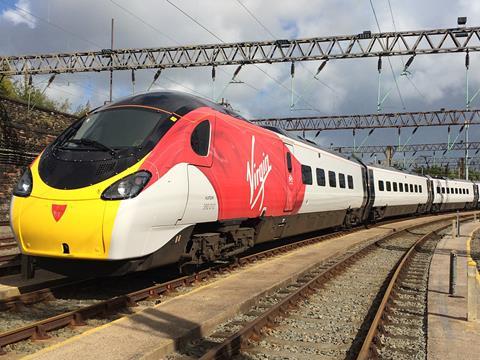
UK: Virgin Group has applied to the Office of Rail & Road for train paths which would enable it to return to the rail network as an open access operator.
The application covers services on the West Coast Main Line from London Euston to Birmingham, Liverpool and Glasgow, and a route from the capital via Manchester to Preston and Rochdale.
A Virgin Group spokesperson told Rail Business UK that ‘whilst this application is just the first step towards exploring what might be possible, we think open access is the way forward. Open access increases consumer choice and competition both of which Virgin has always supported.’
Virgin previously operated franchised services on the WCML through the Virgin Trains joint venture with Stagecoach, until the contract was awarded to the Avanti West Coast joint venture of FirstGroup and Trenitalia which took over in 2019.
‘Virgin is exceptionally proud of everything Virgin Trains and its wonderful onboard teams achieved in the UK’, Virgin Group said on May 20. ‘In the 20 years Virgin Trains operated on the West Coast, they reduced journey times considerably, tripled services on key routes and provided an exceptional customer experience while increasing passenger numbers from 8 million to 42 million per year. The team won many awards for service and was incredibly popular with the British public. We’re confident customers would welcome Virgin Trains back, providing them with much-needed choice and competition.’
Open access segment heating up
The latest proposal came shortly after FirstGroup announced its own application for a London – Manchester – Rochdale open access service, following on from a London – Sheffield route it proposed in January.
In March the Wrexham, Shropshire & Midlands Railway joint venture of consultancy SLC Rail and Alstom applied to launch a service between London and Wrexham, while ORR has given the go-ahead for Grand Union Trains to launch two open access services from London to Stirling and Carmarthen.
Last year Rail Minister Huw Merriman told an industry conference that he was a ‘huge advocate’ of open access services, and was working with the ORR on changes designed to encourage new services.
The opposition Labour party, which is widely expected to form the next government, published a rail strategy last month setting out plans to nationalise the remaining contracted passenger operators as their current contracts expire. Its policy document says that ’for open access operators, wherever there is a case that open access adds value and capacity to the network, they will be able to continue to compete to improve the offer to passengers’.



